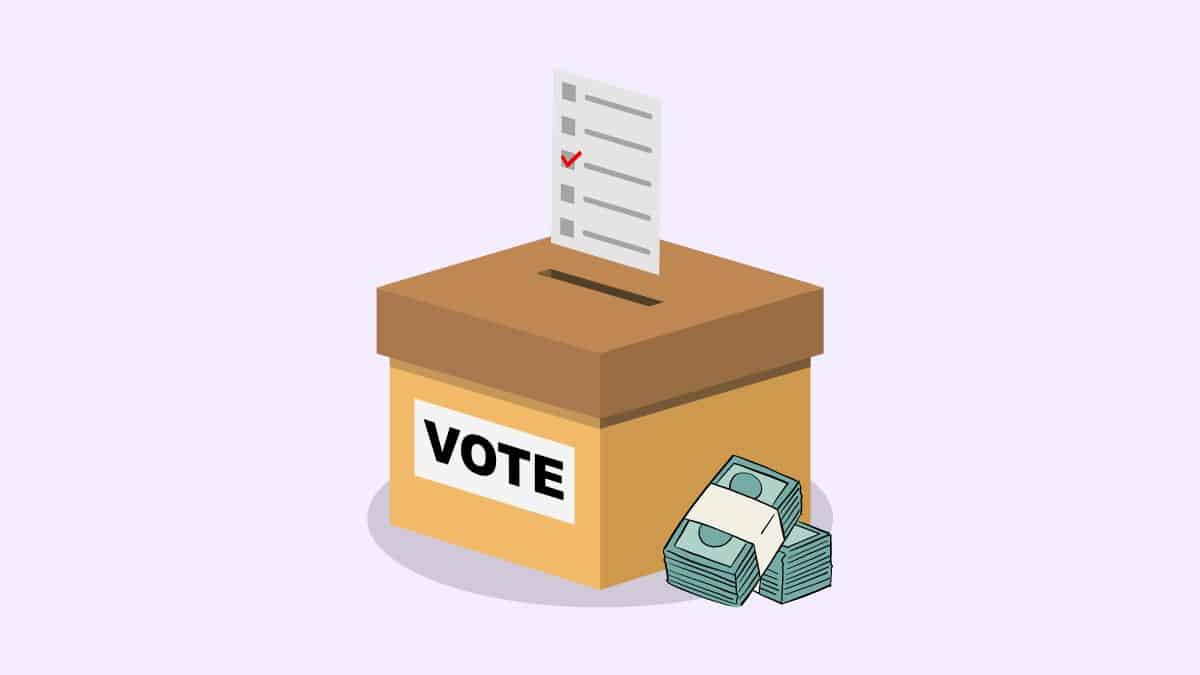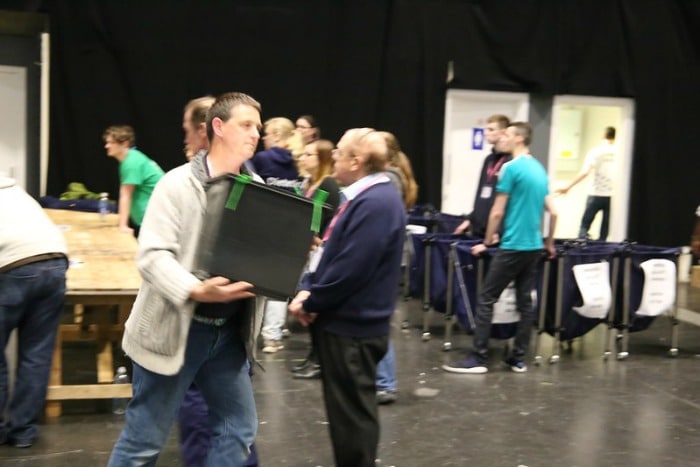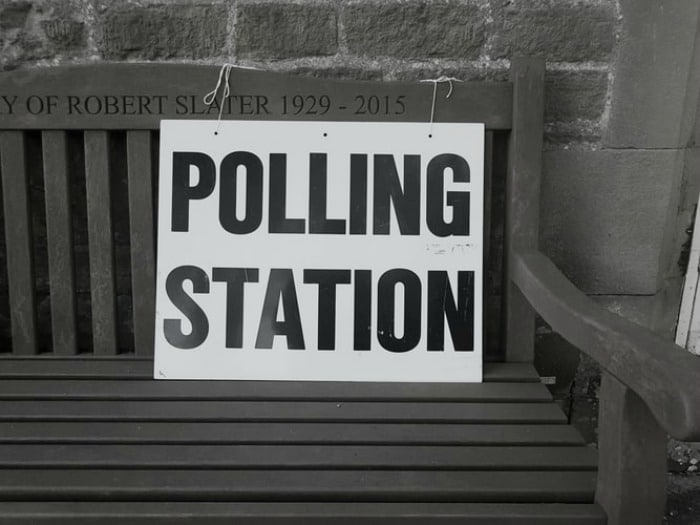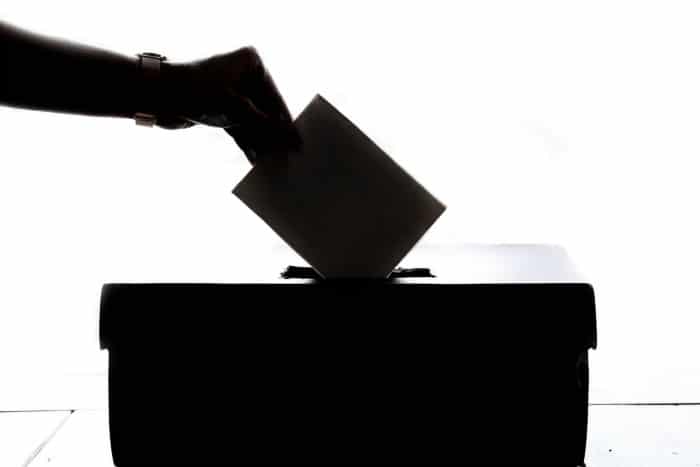You can make up to £200 for a day working in poll stations during the local and general elections.

You may think the people who sit there and hand out voting forms are council workers, having a day out of the office, or people volunteering, but they’re not. They are earning decent money.
As a poll clerk in a polling station, you can earn up to £200 for a day’s work (some roles pay more).
Get a free £10 bonus with Swagbucks
Earn a bit of extra money in your spare time with surveys, videos, and simple tasks you can do at home.
New users can get a £10 bonus when they sign up.
Get the £10 bonus
Jobs at polling stations are one-offs during elections, so they are casual work or a side hustle rather than full-time jobs.
If you’ve got the time, perhaps you’re a student or retired, or you could book the day off work as annual leave to boost your income; this may be perfect for you.
What do poll station staff do?

Polling station staff are there to make sure the voting day runs smoothly and calmly under a democratic process.
They allow people to vote in secret and be free from any influence, as well as make sure all procedures are followed when the polls close.
Staff will help set up equipment, issue ballot papers, mark the electoral register and help complete paperwork.
While polling stations are open for votes from 7 am until 10 pm, staff need to be at the poll station earlier than this to get everything set up before the voters arrive.
Then, afterwards, there’s checking ballots and counting them.
What kind of Poll Station jobs can you do?

There are a few different roles at polling stations which are all carried out on a casual basis:
- Poll Clerk
- Presiding Officer
- Counting Assistant
- Postal Vote Opener
- Canvasser/Poll Card delivery
Poll clerk
Poll Clerks help set up and keep the polling station ticking along during the voting day.
They’ll keep things tidy, answer questions from voters and hand out ballot papers.
You’ll need to have lots of patience as well as have good literacy and numeracy skills.
Presiding Officer
The Presiding Officer will have a good knowledge of elections and will have worked as a Poll Clerk or Officer before.
They will have responsibility for the ballot papers, checking and marking electoral numbers in the register.
When the polls close, they close down the Polling Station, and will also deliver the Ballot Box and any paperwork to where the count is taking place.
Counting assistants
Counting Assistants check and count the votes, but the job doesn’t start until the voting is done.
As people can vote until 10 pm, the voting has to start after this time. Ballot papers are taken to a count venue, and they get checked, sorted and counted.
Some ballot papers are counted in the same evening, through the night, but others will be counted the next day.
You need to have a high level of accuracy (you don’t want to get the count wrong), and you’ll also need to have a strong level of concentration.
Postal Vote Opener
Very simply, but also important, this role deals with the votes of people who opted for the postal vote.
This will be done ahead of the main election day and could be a few days of work.
There will be no counting done (that’s done by the counters after the polls close) but postal vote papers will be opened, checked and prepared for the main count.
People in this role need to maintain a high level of confidentiality due to the information they’ll see.
Canvasser/Poll Card delivery
You may remember a letter coming through your door each year about voters who live at your home. This is for the electoral register.
You’re able to return the information by post or on a website but, if you don’t, you will get a knock at the door from a canvasser who can complete the details for you then and there.
Who can apply for Polling Station and Poll Clerk jobs?

You don’t need to have any qualifications or previous experience to work as a Poll Clerk.
However, you need to be at least 18 years old to work in a polling station. For a Counting Assistant job, some councils say you need to be 18, but some allow 16 year olds to do the role.
You’ll also need to have a right to work in the UK, so you need to provide a passport/birth certificate and proof of your National Insurance number.
While you don’t need any qualifications to carry out any of the roles, you will need to have a particular skill set.
You will need to have good literacy and numeracy skills, be able to work under pressure, be highly accurate, be politically neutral, impartial, confidential, and respectful at all times.
If you’ve had previous customer service-facing roles, it will be helpful.
For some of the roles, you may need to be able to drive and have access to a car, as public transport will not be able to get you to and from the polling station at the opening /closing times.
You cannot have been convicted of an offence under Electoral Legislation to work in a Polling Station.
Also, you are not able to do polling station work if you are a relative of a candidate who is running or if you are doing any work on behalf of a candidate.
Looking for more ways to earn money? Check out these work from home jobs.
How much will you get paid?

The rates of pay for poll clerk jobs and other roles depend on the council.
Each council sets its pay rates.
Here’s an average of the day rates I’ve found:
| Role | Average day rate |
| Poll Clerk | £180 |
| Presiding Officer | £280 |
| Vote Counting Assistant | £90 |
| Postal Vote Opener | £8 – £10 per hour |
Anything else worth knowing?
It’s a long day!
Polling stations are open from 7 am until 10 pm, but you will be there longer to get set up in the morning and help close down.
You’ll likely be working for around 16 hours but will have breaks.
Because it’s a long working day, you will need to waive the Working Time Directive.
Pack a big lunch box
You’re not able to leave the premises where the voting takes place.
Make sure to pack a good breakfast, lunch, dinner, snacks and drinks to see you through and keep your energy up.
You’ll get training
Training is provided, so you won’t need to worry that you’ll be thrown into the deep end.
Apply early
If there is a snap election, then councils may be a bit panicky to get Poll Clerk staff in place. However, they usually have time to plan.
Don’t apply weeks before thinking you’ll get a bit of cash. You will likely need to apply a good few months in advance to give councils time to shortlist people and put training in place.
Money
Each council does things differently.
Most will likely deduct tax from your earnings before you’re paid, but it’s worth checking how it works.
If you’re registered as unemployed, you should check with your local Jobcentre Plus office to see how it affects any benefits.
Where to apply?

Check your local council elections website to see if they’re advertising for any polling jobs.
You will probably need to complete an application form, or you’ll be able to apply via their site.
If you cannot see anything advertised, contact your council directly and ask to speak to the elections team.
Register to vote
Let’s not forget, get yourself registered to vote if you’re not already.
It takes five minutes of your time and then you can vote if you want to – you’ve given yourself the choice.
You only need to register once (or update your address details if you move), and you don’t need to register for every election.
It’s also worthwhile to do to help your credit file.
Saved a few quid with our tips?
If Skint Dad has helped you spend less or feel more in control of your money, you can support the site with a small contribution.
- I was sent a fake HMRC tax notice. Here’s how to spot the scam - 8 January 2026
- A once-a-year money check most families forget (with rough savings) - 6 January 2026
- The January bills reality check: the traffic light method that works - 1 January 2026
